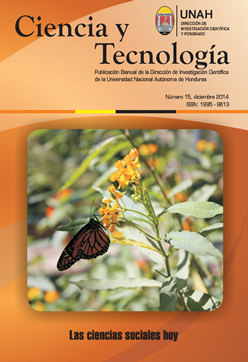Using psychological testing by psychologists in Honduras
DOI:
https://doi.org/10.5377/rct.v0i15.2170Keywords:
psychological test usage, training, attitudes, need for regulations.Abstract
The present study explored which were the predominant test used by psychologists, with a sample of 150 psychologists in two major cities of Honduras. The main purpose was to determine whether the psychologists relied mainly on the test they were trained to use in university undergraduate courses or if they were using test trained for in different job settings or by individual self study methods.
A structured interview method was employed, and the sample consisted of 132 female and 18 male psychologists, mostly graduated from a five year university program (Licenciatura). More than 50 % worked in the public sector, and the main professional areas were clinical psychology, university professor, and human resources.
The sample reported the training and use of a universe of 168 tests, including personality test (26 %), IQ and development scales (15 %), Achievement/Learning (13 %), and career development and planning (7%). The study´s results indicated that the five tests most used were the Bender Visual- Motor Gestalt Test, the Corman Family Drawing Test, the House-Tree-Person Test, MMPI, and the Draw a Person Technique, four of these being drawing techniques. The most popular Intelligence test were the RAVEN, the WESCHLER test, and the PURDUE NON-VERBAL TEST.
The results indicated that the popularity of the drawing test was related to their low cost and ease of use with subjects with lower academic skills. The subjects reported that training in the use of the 168 test was mostly self-directed (79% of the test), followed by on-the-job training programs (66%) and only 20% at undergraduate university programs.
The sample subjects indicated a need for training programs for different test. They also indicated a positive attitude towards test usage, a trust in their validity, and reported that in their diagnostic considerations they relied more in their professional training than in test results. A concern for a lack of national norms was noted. The subjects also emphasized the need for more regulatory measures by the Honduran Psychology Board.
Revista Ciencia y Tecnología, N° 15, December 2014: 71-93
Downloads
6191
Downloads
Published
How to Cite
Issue
Section
License
© Revista Ciencia y Tecnología
Authors who publish in this journal accept the following conditions: In accordance with the legislation of copyright, Revista Ciencia y Tecnología, recognizes and respects the moral right of authors, as well as the ownership of the patrimonial right, which will be ceded to the magazine for its diffusion in open access in printed version and in digital format. By being part of multiple indexers, databases and reference systems, the articles published by Revista Ciencia y Tecnología will be visible and will be downloaded from these websites, indicating, in all cases, the authorship of the articles, the date of publication and the number of the journal to which they correspond.




